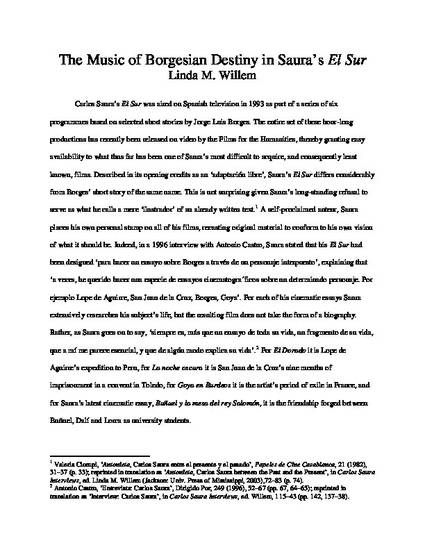
Carlos Saura’s El Sur was aired on Spanish television in 1993 as part of a series of six programmes based on selected short stories by Jorge Luis Borges. The entire set of these hour-long productions has recently been released on video by the Films for the Humanities, thereby granting easy availability to what thus far has been one of Saura’s most difficult to acquire, and consequently least known, films. Described in its opening credits as an ‘adaptación libre’, Saura’s El Sur differs considerably from Borges’ short story of the same name. This is not surprising given Saura’s long-standing refusal to serve as what he calls a mere ‘ilustrador’ of an already written text. A self-proclaimed auteur, Saura places his own personal stamp on all of his films, recasting original material to conform to his own vision of what it should be. Indeed, in a 1996 interview with Antonio Castro, Saura stated that his El Sur had been designed ‘para hacer un ensayo sobre Borges a través de un personaje interpuesto’, explaining that ‘a veces, he querido hacer una especie de ensayos cinematogra´ficos sobre un determinado personaje. Por ejemplo Lope de Aguirre, San Juan de la Cruz, Borges, Goya’. For each of his cinematic essays Saura extensively researches his subject’s life, but the resulting film does not take the form of a biography. Rather, as Saura goes on to say, ‘siempre es, más que un ensayo de toda su vida, un fragmento de su vida, que a mí me parece esencial, y que de algún modo explica su vida’. For El Dorado it is Lope de Aguirre’s expedition to Peru, for La noche oscura it is San Juan de la Cruz’s nine months of imprisonment in a convent in Toledo, for Goya en Burdeos it is the artist’s period of exile in France, and for Saura’s latest cinematic essay, Buñuel y la mesa del rey Salomón, it is the friendship forged between Buñuel, Dalí and Lorca as university students.
This is an Accepted Manuscript of an article published by Taylor & Francis in Bulletin of Spanish Studies, available online: http://wwww.tandfonline.com/10.1080/14753820601007710.
